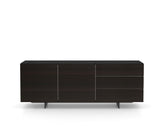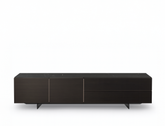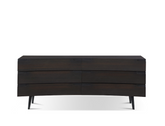Discover Furniture Styles: From Minimalism to Mid-Century
Frequently Asked Questions
1. What is furniture style?
2. What are the key features of minimalism in furniture design?
3. What characterises mid-century modern furniture?
4. What are the elements of industrial style?
5. How can I incorporate eclectic style in my home?
Furniture isn’t just about function; it’s an expression of personal style that sets the tone for your home. Understanding different furniture styles can profoundly enhance your living space's aesthetic and functionality. In this guide, we'll explore a variety of furniture styles, from the clean lines of minimalism to the vintage charm of mid-century modern, and how they can harmoniously coexist in your home. Let’s dive into these exciting styles!
What is Furniture Style?
The term 'furniture style' refers to the specific aesthetic and design principles that characterise a particular period or movement. These can be influenced by many factors, including societal trends, technological advancements, and cultural narratives. When selecting furniture for your home, understanding these different styles can help you create a cohesive look and feel, allowing you to express your personality through your decor.
Minimalism: Less is More
Minimalism is a design philosophy that focuses on simplicity and the essential elements of a space. This style emphasises clean lines, functional forms, and a neutral colour palette, creating an airy and uncluttered environment.
Key Features of Minimalism
- Neutral colours, predominantly whites, blacks, and greys
- Simple and functional furniture, often with geometric shapes
- A lack of decor and accessories, promoting an uncluttered appearance
When incorporating minimalism into your living space, choosing a natural latex mattress can complement this style beautifully. Not only does it offer ergonomic support, but it also aligns with eco-friendly principles often found in minimalist design.
Mid-Century Modern: Timeless Elegance
Mid-century modern furniture refers to pieces designed and produced between the 1940s and 1960s. This style gained immense popularity due to its functional forms and organic shapes, blending seamlessly with the contemporary design ethos.
Characteristics of Mid-Century Modern
- Rich colours and finishes, often highlighting wood grain
- Functional forms with a focus on simplicity and beauty
- Integration with nature, often seen through large windows and outdoor spaces
A defining feature of mid-century modern spaces is the use of distinctive, stylish dining chairs that encourage gatherings and social interactions. Their iconic designs can often serve as statement pieces in your dining area, blending function with aesthetic appeal.
Industrial Style: Urban Edge
Industrial style is inspired by the repurposed loft spaces found in cities, weaving in raw materials and an unfinished look that celebrates the beauty in imperfection. It combines the ruggedness of factories with a sophisticated flair, perfect for contemporary homes looking for that edgy vibe.
Key Elements of Industrial Style
- Raw materials, such as exposed brick and metal beams
- Dark and moody colour palettes, often utilising grey, black, and brown furniture
- Vintage and reclaimed pieces that contribute to a sense of history
The combination of metal and wood can bring warmth and character to a space while providing durability, making industrial pieces a great choice for high-traffic areas such as kitchens and dining spaces.
Scandinavian Design: The Art of Living
Scandinavian design is known for its unrivalled functionality blended with minimalism. Originating from the Nordic countries, this style is all about creating a warm, inviting atmosphere with a focus on simplicity and practicality.
What Makes Scandinavian Design Unique?
- Light colour schemes with an emphasis on whites, pastels, and natural wood
- Focus on natural light, with large windows to brighten spaces
- Functionality intertwined with beauty, creating essential furniture without sacrificing aesthetics
Adding a natural latex mattress is particularly harmonious with Scandinavian aesthetics, promoting sustainable living alongside comfort. The soft, clean lines of Scandinavian furniture create a serene environment that encourages relaxation and ease.
Bohemian (Boho) Style: Vibrant and Eclectic
If you’re a free spirit, the bohemian style may speak to your heart. This approach is all about layering textures, colours, and patterns to create a unique, personalised space that reflects the owner’s individuality and creativity.
Bohemian Design Elements
- Rich, vibrant colours, often juxtaposed with earthy tones
- Eclectic mix of patterns and textures, such as rugs, throws, and cushions
- Global and vintage-inspired pieces that tell a story
To add depth to your bohemian style, consider including statement chairs and unique coffee tables that serve as conversation starters. The key is to mix and match, ensuring your space feels curated and welcoming.
Traditional Style: Classic and Timeless
Traditional furniture styles take inspiration from the historical aesthetics of various periods, featuring ornate detailing and rich wood finishes. This style invokes a sense of nostalgia and grandeur, ideal for those who appreciate classic elegance.
Elements of Traditional Style
- Rich colour palettes, often with greens, deep reds, and browns
- Intricate detailing on furniture pieces, including carvings and mouldings
- Symmetrical arrangements promoting balance and order
Incorporating classic dining chairs adds a refined touch, making spaces suitable for both formal gatherings and casual family meals. The traditional style embraces comfort without compromising on sophistication.
Eclectic Style: Mix It Up!
For those who love creativity, the eclectic style is a blend of various design elements that don’t seem to belong together. This approach allows an individual to showcase their personality and experiences, creating a dynamic and engaging space.
Building an Eclectic Space
- Mix and match patterns, colours, and materials to create variety
- Incorporate personal items, art, and vintage finds for character
- Choose a unifying theme or colour palette to create coherence
The eclectic style thrives on creativity and allows you to curate pieces that resonate with your history or dreams, making each room feel uniquely yours.
Art Deco: Bold and Luxurious
Art Deco emerged in the 1920s and 1930s, characterised by glamour, luxury, and exuberance. This style combines rich colours and bold geometric patterns, making it both eye-catching and sophisticated.
Art Deco Highlights
- Bold geometric shapes and symmetrical designs
- Luxurious materials such as chrome, glass, and lacquered wood
- Vibrant colours combined with metallic finishes for an opulent feel
Art Deco furniture often stands out as statement pieces. When designing an Art Deco space, consider including furniture that features rich textures to create an atmosphere of indulgence.
Crafting Your Unique Style
Understanding furniture styles is the first step to crafting a home that tells your unique story. However, the most beautiful spaces often blend elements from different styles. Don’t limit yourself to just one; explore combinations that resonate with your personality and lifestyle.
As you embark on your interior design journey, remember to focus on comfort and functionality while expressing your individuality through the pieces you choose. From a natural latex mattress that supports your well-being to stylish dining chairs that invite friends and family over, every choice counts in creating the ideal living space.
Your Personal Design Journey Awaits!
The world of furniture styles is intricate and expansive, offering endless possibilities for any home. Whether you’re a minimalist at heart or someone who thrives in vibrant bohemian decor, there's a style that suits you. Explore, experiment, and create a space that's a true reflection of you. Happy decorating!







